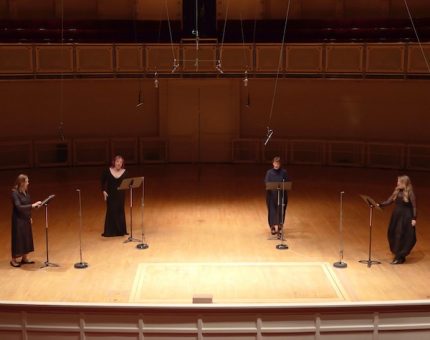Mazzoli concludes MusicNOW tenure with typically varied and eclectic swan song

The Chicago Symphony Orchestra has been fortunate, on balance, in its choices of composer in residence in the 34 years since the post was created, with John Corigliano as its initial occupant.
The CSO’s MusicNOW contemporary music series has had its growing pains, even some missteps, to be sure. But the series’ strong institutional commitment to the music of our time remains to this day as the current composer in residence, Missy Mazzoli, hands over the artistic reins to her successor, Jessie Montgomery.
Mazzoli’s three-year tenure, which comes to an end this month, was, through no fault of her own, a drastically abridged residency fraught with cancellations and postponements brought on by the Covid-19 pandemic. Yet she, like the institution that employed her, carried on valiantly.
Her curatorial swan song, Episode 22 of the orchestra’s streaming CSO Sessions, was released Thursday and is available through July 23 via the CSOtv platform.
Some of MusicNOW’s most lasting achievements have been engineered by resident women composers – one thinks particularly of the productive residencies of Shulamit Ran, Augusta Read Thomas and Anna Clyne. It’s tempting to think of the possibilities of musical discovery and audience development had Mazzoli been granted the uninterrupted tenure of her predecessors.
Thursday’s filmed concert, as Mazzoli explained in her introduction, was made up entirely of recent chamber vocal and instrumental works that had been scheduled for performance on last year’s series and were now receiving MusicNOW premieres. Three of the four pieces enlisted the services of the splendid female vocal quartet Quince, and women of color were well represented. A CSO string quartet and members of the orchestra’s woodwind, brass and percussion sections also took part.
Clear sonics and smooth camerawork upheld the high standards of previous episodes of CSO Sessions, adding a certain technical frisson to counterbalance the canned ambience of a largely bare Armour Stage and an Orchestra Hall devoid of audience members.
The longest and most substantial work on the 50-minute program was composer-pianist Courtney Bryan’s Requiem, a MusicNOW commission receiving its belated world premiere. Bryan’s work shared the bill with another world premiere, Chicago-based composer David Reminick’s The Pub, for four voices; Gilda Lyons’ a cappella vocal duet Bone Needles, and Prospective Dwellers, a string quartet by Chicago composer, cellist and educator Tomeka Reid.
The 20-minute Bryan opus, for vocal quartet and five woodwind, brass and percussion players, was composed prior to the pandemic but assumes timely resonance at a time when Covid deaths are still being tallied and humankind struggles to regain a sense of normalcy. The composer dedicated the premiere to “the memory of those who have lost their lives during this past year.”
Bryan’s compositional voice is nothing if not eclectic. Texts from the Bible and the traditional Latin mass are set to music that draws on elements including the Anglican requiem and jazz suggesting an African-American “street funeral” in New Orleans. Harmonies are rooted in tonal diatonicism, with blue notes, suspensions and borrowings from pop realms. The vocalism ranges from conventional choral chant to humming, spoken passages and whispered sibilants. Vocal settings are spare yet with the words repeated often enough to make the texts intelligible. Spare, too, are the instrumental solos and punctuation, notably the quiet rattle of maracas in the benediction-like final section.
Such is Bryan’s command of her craft that what could easily have devolved into an incoherent mashup of disparate styles emerges as a unified, moving lament for lost lives that echoes across several world cultures. The Quince vocalists—collectively and individually—were simply amazing in pitch, blend, enunciation and expressive conviction; and the CSO winds, brass and percussion gave their best as well, under the urgent and caring direction of Edwin Outwater.
Commissioned for dancer Amy Pivar, the five-minute Bone Needles takes its title from the implements used to mend nets in a Nicaraguan fishing village visited by Lyons. Two (unidentified) singers from Quince, facing each other from opposite ends of the stage, merged voices in soaring arcs and deep dives, their intersecting glissandos kicking up piquant fleeting dissonances. Repeated rhythms suggested the casting of fishing nets and lapping of ocean waves on sandy shores.
The Pub is a section from David Reminick’s five-part song cycle, In Dreams, inspired by personal recollections of the unconscious nocturnal musings of the composer’s friends. The disquieting paranoia of the text is mirrored by a vocal soundscape of “straight” (albeit metrically shifting) vocalism laced with hallucinatory trills and Sprechgesang (speech-song) that at times calls to mind the nightmarish realm of Arnold Schoenberg’s Pierrot Lunaire. In a technically demanding piece lasting no more than eight minutes, the Quince foursome matched pitches, attacks, releases and more with uncanny precision. Despite the singers’ painstakingly clear diction, the words were at times hard to follow (a printed text is available at the website). Reminick’s teaser made one want to hear the entire cycle.
Prospective Dwellings is an adaptation—premiered in 2016 by the Spektral Quartet at the Ear Taxi Festival—of a piece originally written for the Hyde Park Jazz Festival when Reid was artist in residence. Post-minimalist rhythmic ostinatos drive much of the ten-minute piece. The busy polyphonic web eases up at key junctures to allow lyrical ideas to surface in the viola and, later, cello parts. The attractive score went down agreeably in the expert hands of CSO members Susan Synnestvedt and Baird Dodge, violins; Youming Chen, viola, and Richard Hirschl, cello.
The Quince roster consisted of Liz Pearse, Amanda DeBoer Bartlett and Carrie Henneman Shaw, sopranos, and Kayleigh Butcher, mezzo-soprano. Players taking part in the Bryan Requiem were CSO stalwarts Stephen Williamson, clarinet; Tage Larsen, trumpet; Charles Vernon, trombone; Gene Pokorny, tuba, and Vadim Karpinos, percussion.
The streaming program is available through July 23 at CSOtv.
Posted in Performances

